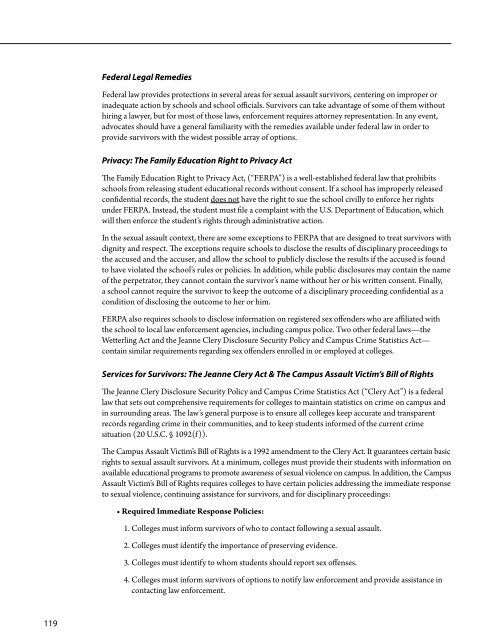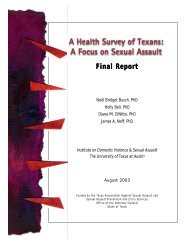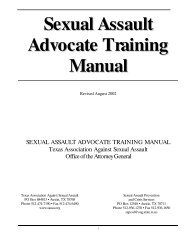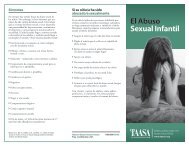Sexual aSSault LEGAL ADVOCACY MANUAL - Texas Association ...
Sexual aSSault LEGAL ADVOCACY MANUAL - Texas Association ...
Sexual aSSault LEGAL ADVOCACY MANUAL - Texas Association ...
You also want an ePaper? Increase the reach of your titles
YUMPU automatically turns print PDFs into web optimized ePapers that Google loves.
Federal Legal Remedies<br />
Federal law provides protections in several areas for sexual assault survivors, centering on improper or<br />
inadequate action by schools and school officials. Survivors can take advantage of some of them without<br />
hiring a lawyer, but for most of those laws, enforcement requires attorney representation. In any event,<br />
advocates should have a general familiarity with the remedies available under federal law in order to<br />
provide survivors with the widest possible array of options.<br />
Privacy: The Family Education Right to Privacy Act<br />
The Family Education Right to Privacy Act, (“FERPA”) is a well-established federal law that prohibits<br />
schools from releasing student educational records without consent. If a school has improperly released<br />
confidential records, the student does not have the right to sue the school civilly to enforce her rights<br />
under FERPA. Instead, the student must file a complaint with the U.S. Department of Education, which<br />
will then enforce the student’s rights through administrative action.<br />
In the sexual assault context, there are some exceptions to FERPA that are designed to treat survivors with<br />
dignity and respect. The exceptions require schools to disclose the results of disciplinary proceedings to<br />
the accused and the accuser, and allow the school to publicly disclose the results if the accused is found<br />
to have violated the school’s rules or policies. In addition, while public disclosures may contain the name<br />
of the perpetrator, they cannot contain the survivor’s name without her or his written consent. Finally,<br />
a school cannot require the survivor to keep the outcome of a disciplinary proceeding confidential as a<br />
condition of disclosing the outcome to her or him.<br />
FERPA also requires schools to disclose information on registered sex offenders who are affiliated with<br />
the school to local law enforcement agencies, including campus police. Two other federal laws—the<br />
Wetterling Act and the Jeanne Clery Disclosure Security Policy and Campus Crime Statistics Act—<br />
contain similar requirements regarding sex offenders enrolled in or employed at colleges.<br />
Services for Survivors: The Jeanne Clery Act & The Campus Assault Victim’s Bill of Rights<br />
The Jeanne Clery Disclosure Security Policy and Campus Crime Statistics Act (“Clery Act”) is a federal<br />
law that sets out comprehensive requirements for colleges to maintain statistics on crime on campus and<br />
in surrounding areas. The law’s general purpose is to ensure all colleges keep accurate and transparent<br />
records regarding crime in their communities, and to keep students informed of the current crime<br />
situation (20 U.S.C. § 1092(f)).<br />
The Campus Assault Victim’s Bill of Rights is a 1992 amendment to the Clery Act. It guarantees certain basic<br />
rights to sexual assault survivors. At a minimum, colleges must provide their students with information on<br />
available educational programs to promote awareness of sexual violence on campus. In addition, the Campus<br />
Assault Victim’s Bill of Rights requires colleges to have certain policies addressing the immediate response<br />
to sexual violence, continuing assistance for survivors, and for disciplinary proceedings:<br />
• Required Immediate Response Policies:<br />
1. Colleges must inform survivors of who to contact following a sexual assault.<br />
2. Colleges must identify the importance of preserving evidence.<br />
3. Colleges must identify to whom students should report sex offenses.<br />
4. Colleges must inform survivors of options to notify law enforcement and provide assistance in<br />
contacting law enforcement.<br />
119
















